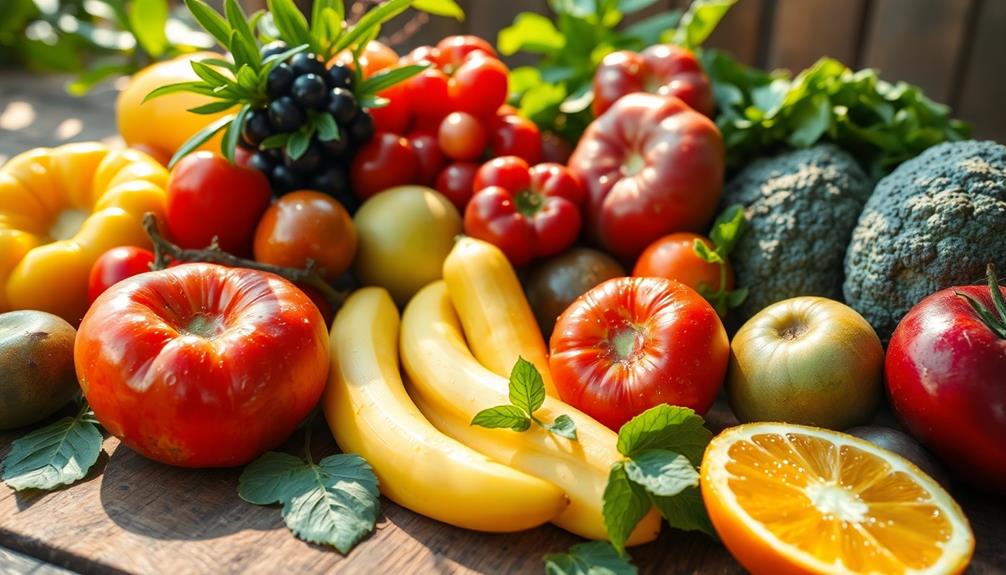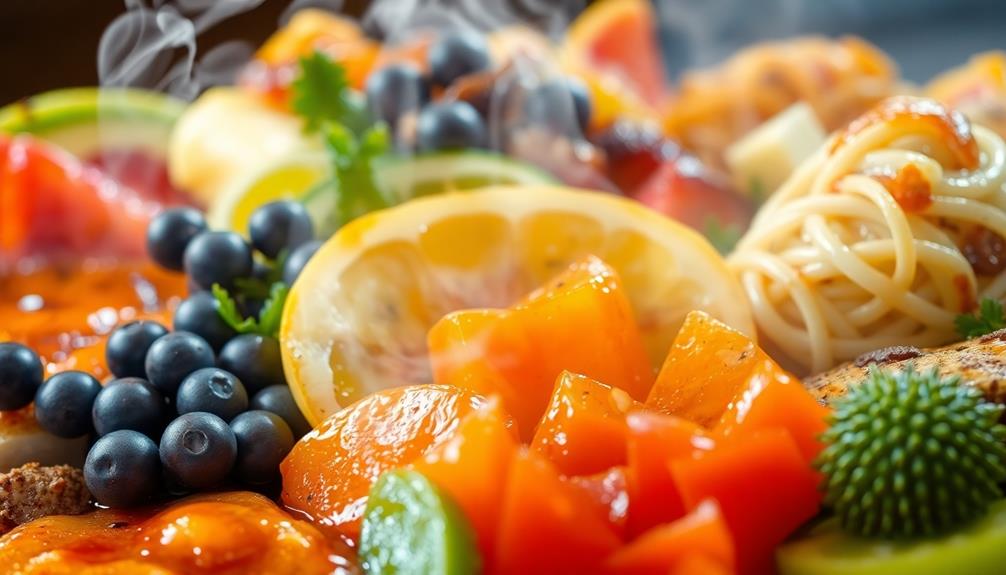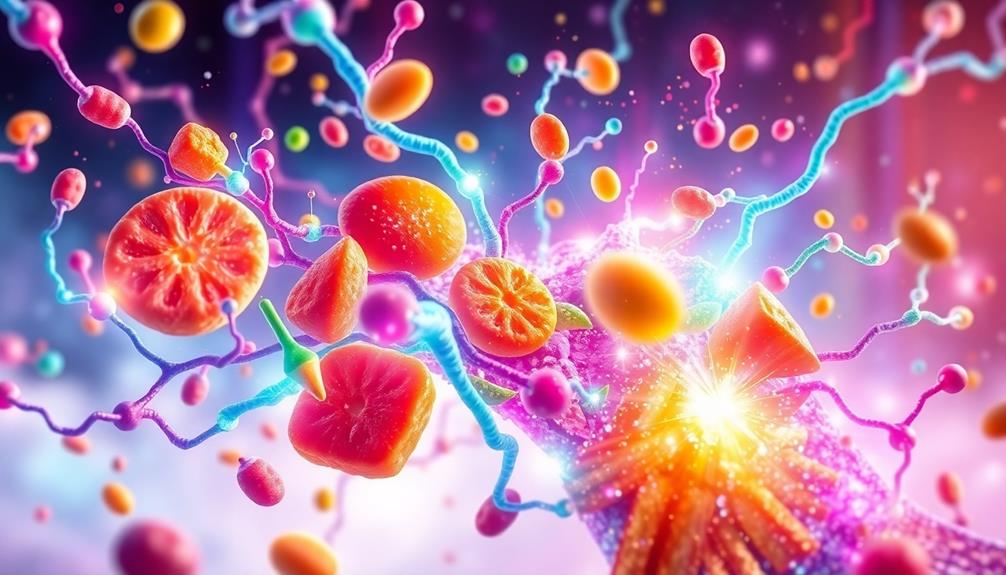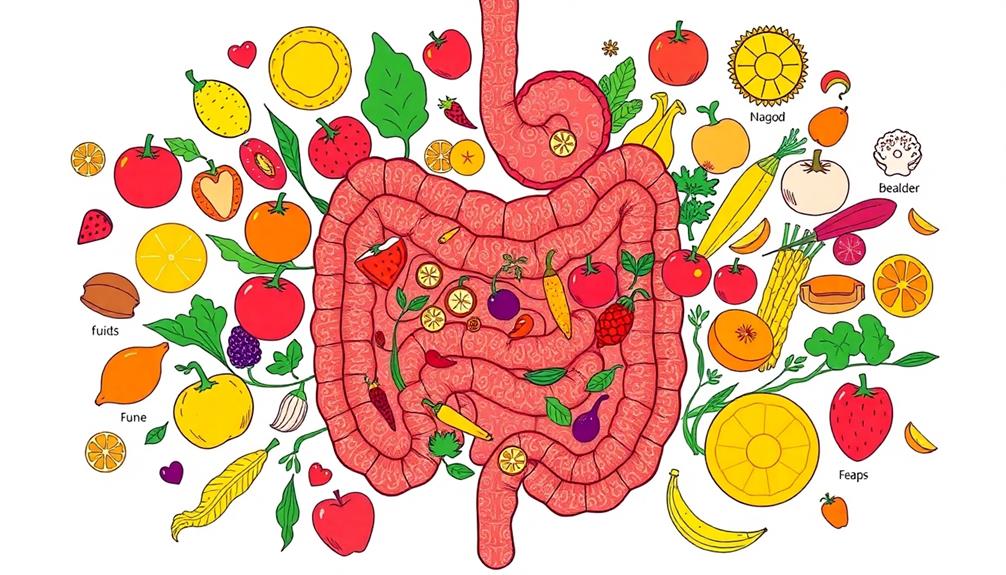Some people feel 'food euphoria' more intensely due to their genetics, lifestyle, and the foods they eat. If you enjoy fresh fruits and vegetables, you're likely boosting your mood with neurotransmitters like dopamine and serotonin. Your sensitivity to these chemicals can vary, affecting how much joy you experience. Processed foods might dull your taste buds, while whole foods bring genuine flavors that enhance satisfaction. Factors like meal timing and your eating environment also play a role. Discovering what elevates your food experiences can change how you relate to meals and enhance your enjoyment further.
Key Takeaways
- Genetic variations influence neurotransmitter sensitivity, affecting individual experiences of food-induced euphoria.
- Long-term consumption of processed foods can dull taste buds, reducing enjoyment of natural flavors.
- The gut-brain axis links digestion and emotional well-being, impacting overall food experiences.
- Meal context, including anticipation and cultural traditions, enhances emotional responses to food.
- Higher spice tolerance and challenges can trigger greater endorphin and dopamine release, intensifying feelings of euphoria.
Euphoria From Natural Foods

When you indulge in fresh fruits and vegetables, you might feel a subtle wave of euphoria wash over you. This sensation isn't just a coincidence; it stems from the positive effects these foods have on your mood and overall sensory experience.
As you savor the natural sweetness of ripe berries or crisp greens, your taste buds awaken, enhancing your connection to food. Traditional dishes like Kue Putu and Dadar Gulung also highlight how natural ingredients can elevate your dining experience.
Vegan stews made from unprocessed ingredients can heighten this pleasure too. Unlike packaged foods, they offer pure flavors that nourish both body and spirit.
Initially, you may find it takes time to adjust to whole, natural foods, but as you embrace this change, your appreciation for flavors deepens. Over months, you'll likely notice a more satisfying eating experience.
Evolutionary Eating Perspectives

When you think about what you eat, consider how your brain rewards you for choosing natural foods. These options activate your reward system, releasing feel-good chemicals that enhance your enjoyment.
For instance, indulging in dishes like Coconut Candy or Brigadeiro can elevate your mood, as they're made from wholesome ingredients that provide both satisfaction and joy.
As you shift from processed to whole foods, you'll likely notice a richer flavor experience and a deeper sense of satisfaction.
Evolutionary Reward Mechanisms
The intricate evolutionary reward mechanisms in our brains play an essential role in shaping our food preferences and eating behaviors. When you consume whole foods, your brain releases endorphins and dopamine, creating feelings of satisfaction and euphoria. This response is critical for survival, as it encourages you to seek out nutrient-dense foods that promote health and well-being.
For instance, dishes like Nettle and Potato Soup showcase how fresh, whole ingredients can provide both nourishment and pleasure. Whole foods, which release sugars and fats slowly, activate your brain's reward pathways more effectively than refined options. This slower release leads to a more pronounced sense of satisfaction, helping you to appreciate the flavors and textures of what you eat.
In contrast, modern diets laden with refined sugars and fats can disrupt these mechanisms, creating a cycle of seeking immediate pleasure over the long-term benefits of wholesome foods.
Natural Food Preferences
Often, our natural food preferences are deeply rooted in evolutionary history, shaping not just what we enjoy but also how our bodies respond to different types of foods. As humans evolved, we developed a liking for natural foods, which provided a slow release of sugar and fat. This slow release promotes feelings of reward and satisfaction, essential for our survival.
For instance, traditional foods like Dorayaki (Red Bean Pancake) highlight how the combination of simple ingredients can evoke pleasurable sensations. The positive sensations you experience when consuming healthy, whole foods stem from adaptations that favored nutrient-rich options over less healthy ones.
However, modern diets often prioritize refined sugars and fats, which can dull your appreciation for the subtle flavors of natural foods. Transitioning from processed items to whole foods can greatly enhance your ability to enjoy the complex flavors and textures of local produce.
Learning to Appreciate Flavors

Appreciation for flavors evolves as you shift from processed foods to whole ingredients, revealing a domain of taste you mightn't have noticed before. This change takes time, but as you adapt, your understanding of flavor deepens.
When you start exploring produce from Community Supported Agriculture (CSA), you'll likely notice subtle differences in taste that enhance your culinary experience. Incorporating traditional Mexican dishes, such as Chilaquiles, can further enrich your palate, as these meals highlight fresh ingredients and robust flavors.
Venturing into various cooking techniques allows you to experiment with fresh ingredients, giving you creative freedom in the kitchen. You'll find that your meals become more enjoyable as you learn how to highlight the natural flavors of vegetables, including the unexpected sweetness of unrefined varieties.
As you become familiar with local vegetables, you may discover that they taste sweeter than the processed fruits you once preferred. This gradual adjustment to whole foods can rekindle your appreciation for flavors often overshadowed by the intense sweetness of refined options.
You might even find yourself drawn to spicy foods, where the complexity of flavors can ignite your palate in ways you never imagined. Embracing this journey opens up an exciting domain of taste that enhances your overall food experience.
Effects of Processed Foods

Processed foods can really change how you taste things, making you crave those bold flavors while dulling your appreciation for the subtler ones.
For example, the rich flavors of dishes like Red-Braised Pork Belly highlight the depth that natural ingredients can offer.
Over time, your taste sensitivity can shift, leaving you less satisfied with natural foods.
It might take some time to adjust, but embracing whole foods can help you rediscover the joy in their genuine flavors.
Diminished Flavor Perception
Many people don't realize that long-term consumption of processed foods can dull your taste buds, making it harder to enjoy the subtle flavors of whole foods. When you indulge in high-sugar and high-fat snacks, you might find the intense flavors overpower the delicate tastes of fruits and vegetables, leading to diminished flavor perception.
This alteration can create an initial preference for processed options, making natural flavors seem less enjoyable. For example, savoring the rich blend of spices in a dish like Mushroom Masala can remind you of the complexity found in whole foods.
Fortunately, it's possible to restore your appreciation for those flavors. Gradually shifting from processed foods to whole foods can greatly enhance your sensory experience. By avoiding refined sugars, fats, and added salts, you allow the natural sweetness of vegetables to shine through, improving flavor perception.
Additionally, engaging with Community Supported Agriculture (CSA) produce over time helps deepen your understanding and appreciation of the distinct flavors and textures found in whole foods.
As you embrace this journey, you'll likely discover a renewed joy in eating—one that celebrates the subtleties you once overlooked. Ultimately, by choosing whole foods, you can reclaim your taste buds and experience food euphoria like never before.
Altered Taste Sensitivity
Transforming your diet can greatly impact your taste sensitivity, especially if you've been relying on processed foods. When you consume high-sugar and high-fat snacks regularly, you might experience altered taste sensitivity. This long-term habit can dull your ability to appreciate the rich flavors of natural foods, making it hard to savor subtler tastes.
For instance, the exquisite flavors found in traditional dishes like Agnolotti or Pasta Alla Norma can be overshadowed by the overpowering sweetness of processed snacks.
As your palate becomes accustomed to the intense flavors found in processed items, you may find yourself gravitating towards them, which overshadows the enjoyment of fresh fruits and vegetables.
Fortunately, there's hope! By gradually shifting to a diet rich in whole foods, you can restore your taste sensitivity. This change allows you to rediscover the natural sweetness and complexity of unrefined produce.
Research shows that prolonged exposure to processed foods not only affects your taste buds but also alters your brain's reward pathways.
As you embrace whole foods, you'll enhance your overall eating experience, tuning your palate to the nuanced flavors and textures that fresh produce offers.
In time, you'll find that the pleasure derived from wholesome meals can create a deeper sense of food euphoria than you ever thought possible.
Neurotransmitters and Euphoria

Neurotransmitters play an essential role in the euphoric sensations you experience while enjoying your meals. When you're eating food, your brain releases various chemicals that elevate your mood and enhance pleasure.
Endorphins, often called "feel-good hormones," surge during and after meals, contributing greatly to feelings of euphoria. The joy of savoring traditional dishes, such as Ethiopian favorites, can further amplify these sensations, bringing a unique cultural experience into the mix.
Dopamine, another key neurotransmitter, kicks in while you're indulging in your favorite dishes, making the experience even more enjoyable. Carbohydrate-rich meals can boost serotonin levels, further amplifying your post-meal bliss.
The interplay between these neurotransmitters creates a unique emotional response that varies among individuals.
Here are some factors influencing the release of these neurotransmitters:
- Endorphin release: Triggered by satisfying meals or favorite treats.
- Dopamine spikes: Occur during enjoyable eating moments.
- Serotonin increase: Linked to carbohydrate consumption.
- Genetic variations: Influence neurotransmitter sensitivity.
- Gut-brain axis: Connects digestion and emotional well-being.
Understanding how these neurotransmitters affect your eating experience can help you appreciate the joy of food even more. Embrace the feelings of euphoria that come with each delightful bite!
Individual Differences in Experience

Everyone experiences food euphoria differently, influenced by a range of factors that shape how you respond to meals. Genetic factors may play a role in your neurotransmitter secretion, affecting the intensity of your food experiences. If you have heightened sensitivity to food-induced euphoria, you might enjoy meals more intensely than others.
Lifestyle factors, such as stress levels and sleep quality, can also impact your neurotransmitter balance, further influencing how you perceive food frequently. Hormonal fluctuations, particularly during different life stages or menstrual cycles, can alter your mood responses to meals, enhancing or diminishing your euphoria.
Your psychological background, including past experiences and attitudes toward food, shapes your emotional responses. Here's a quick overview of factors affecting your food euphoria: For example, someone who has a history of emotional eating may be more prone to seeking out food as a source of comfort and pleasure. On the other hand, someone with a negative attitude toward food due to past dieting experiences may struggle to find enjoyment in eating. Furthermore, the psychological impacts of natural foods, such as the association of fresh fruits and vegetables with feelings of health and vitality, can also play a role in shaping your emotional responses to food. Additionally, the contrast between natural vs processed foods can also influence your emotional responses to food. Some individuals may feel a sense of guilt or shame when consuming processed foods due to societal messages about their negative health effects. On the other hand, natural foods may elicit feelings of virtuousness and well-being. These psychological associations with different types of food can significantly impact your overall food euphoria and satisfaction.
| Factor | Influence on Food Euphoria |
|---|---|
| Genetic Sensitivity | Higher neurotransmitter response |
| Lifestyle Factors | Stress and sleep affecting enjoyment |
| Psychological Attitudes | Past experiences shaping emotional responses |
Recognizing these individual differences can help you understand why your food experiences might differ from those of your friends or family.
Timing and Meal Context

The moments surrounding a meal can greatly enhance your experience of food euphoria. Timing and context play pivotal roles in how intensely you feel pleasure from food. For instance, when you dine with friends or family, the social atmosphere can amplify your enjoyment, making each bite taste even better.
Enjoying traditional dishes like Kawarma can also elevate this experience, as the rich and savory flavors bring a sense of cultural connection and nostalgia.
Consider these factors that contribute to food-related euphoria:
- Anticipation: Looking forward to a meal triggers dopamine release, heightening your emotional response.
- Timing: Euphoria peaks about 30 minutes after eating, coinciding with digestion and neurotransmitter release.
- Regular Patterns: Sticking to a routine can stabilize mood fluctuations, leading to a more consistent euphoria.
- Cultural Traditions: Celebrating meals within cultural contexts can deepen your emotional connection to food.
- Environment: The setting where you eat, whether cozy or festive, influences your overall experience.
Health Effects of Food Euphoria

Food euphoria isn't just a fleeting pleasure; it has significant health effects that can enhance your overall well-being. When you experience food euphoria, your mood elevates, thanks to the release of neurotransmitters like endorphins and dopamine. This boost not only makes you feel good but can also encourage healthier eating habits.
By reinforcing positive feelings associated with nutritious foods, food euphoria helps you make better dietary choices over time.
However, chronic low mood and stress can dampen your experience of food euphoria. When you're feeling down, you might crave high-calorie foods that provide temporary relief but lead to unhealthy eating patterns.
Understanding the physiological and psychological mechanisms behind food-induced euphoria is essential. It can help you manage emotional responses to food, fostering a healthier relationship with eating.
Spice and Sensory Pleasure

Experiencing food euphoria can take on many forms, and one of the most exhilarating ways to elevate your mood is through spicy foods. When you consume spicy dishes, capsaicin activates pain receptors in your mouth, triggering the release of endorphins and dopamine. This chemical cocktail heightens your feelings of pleasure, giving you a euphoric rush similar to a runner's high.
Engaging in spicy food challenges, especially those popularized on social media, can enhance this experience. Overcoming perceived pain together creates shared joy, amplifying your sense of achievement.
Here are some reasons why you might crave that spicy thrill:
- Spicy foods can ignite endorphin release, boosting your mood.
- Higher spice tolerance leads to more intense euphoric responses.
- The challenge of consuming spicy dishes can feel like an adrenaline rush.
- Sharing spicy food experiences creates a sense of camaraderie.
- Repeated engagement with spicy foods fosters a cycle of pleasure.
Frequently Asked Questions
Why Do I Feel Euphoria When I Eat?
You feel euphoria when you eat because your brain releases neurotransmitters like dopamine and endorphins, enhancing your mood. The composition of your meals and the social context can also amplify these pleasurable sensations.
Can Certain Food Make You Feel High?
Imagine savoring a rich chocolate cake; as you indulge, your brain releases feel-good chemicals, creating a euphoric high. Yes, certain foods can indeed trigger these sensations, making each bite feel like a delightful escape.
Why Do Some Foods Make You Feel More Full Than Others?
Some foods make you feel fuller because they're high in fiber, protein, or water content. They slow digestion and enhance hormones that signal fullness, helping you maintain satiety and reduce hunger effectively.
Why Do I Feel More Stoned After Eating?
You might feel stoned after eating due to endorphins and dopamine released during meals. Consuming carbs boosts serotonin, enhancing your mood and creating that relaxed sensation, especially in enjoyable environments or with good company.
Conclusion
In the delightful dance of flavors, some folks find themselves swept away in a wave of bliss, savoring every bite as if it were a symphony of joy. This enchanting experience, influenced by our unique palates and the world around us, can turn a simple meal into a celebration of life. By embracing the nuances of taste, you can elevate your culinary adventures, transforming everyday dishes into moments of pure, delectable delight that nourish both body and soul.









